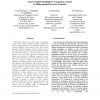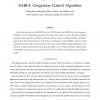474 search results - page 5 / 95 » Experience with Active Congestion Control |
IWQOS
2005
Springer
14 years 25 days ago
2005
Springer
Abstract. TCP experiences serious performance degradation in wireless multi-hop networks with its probe-based, loss-driven congestion control scheme. We describe the Wireless eXpli...
INFOCOM
2000
IEEE
13 years 11 months ago
2000
IEEE
— The packet losses imposed by IP networks can cause long and erratic recovery delays, since senders must often use conservative loss detection and retransmission mechanisms. Thi...
ISCC
2003
IEEE
14 years 19 days ago
2003
IEEE
This paper presents a new active queue management scheme, Fuzzy Explicit Marking (FEM), implemented within the differentiated services (Diff-Serv) framework to provide congestion ...
NETWORKING
2004
13 years 8 months ago
2004
Several new protocols such as RBUDP, User-Level UDP, Tsunami, and SABUL, have been proposed as alternatives to TCP for high speed data transfer. The purpose of this paper is to an...
CN
2007
13 years 7 months ago
2007
Receiver-driven TCP protocols delegate key congestion control functions to receivers. Their goal is to exploit information available only at receivers in order to improve latency ...


